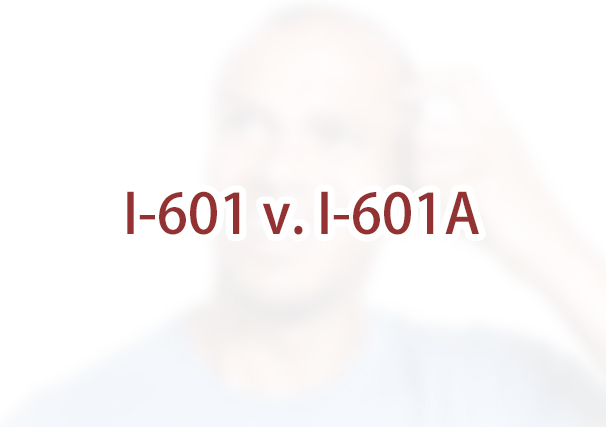
Question: I entered the U.S. over 10 years ago without inspection. I was told I needed a waiver to apply for a green card. How do I know which waiver to file? What’s the difference between an I-601 and I-601A waiver?
Answer: Form I-601 and I-601A have a different process and requirements.
Form I-601A, Application for Provisional Unlawful Presence Waiver
Pursuant to Immigrant and Nationality Act section 212(a)(9)(B), If you accrue more than 180 days of unlawful presence in the U.S. and then depart the U.S., you are subject to a 3-year bar before you can return to the U.S. If you accrue more than one year of unlawful presence in the U.S. and then depart the U.S., you are subject to a 10-year bar before you can return to the U.S.
If you have a spouse or parent who is a U.S. citizen or lawful permanent resident who would suffer extreme hardship if you are not able to return to the U.S., you can submit a Form I-601A to request a waiver of the 3-year or 10-year bar.
You can only file a Form I-601A waiver if you meet the following criteria:
- You are inadmissible because you have incurred the 3-year or 10-year bar;
- Your spouse or parent is a U.S. citizen or lawful permanent resident;
- Your spouse or parent will suffer extreme hardship if you are not able to return to the U.S.;
- You are physically present in the United States; and
- You are at least 17 years old. Unlawful presence does not begin accruing until an individual turns 18. However, the Department of State allows individuals the option to file the waiver at age 17.
Form I-601A is a standalone application. You cannot file Form I-601A with any other applications, petitions, or requests for immigration benefits. If you submit your Form I-601A with any other forms, your application will be rejected and returned to you with the filing fee.
You may file Form I-601A only after your Form I-130 is approved. If your Form I-601A is approved, you must then leave the U.S., attend an immigrant visa interview at an U.S. Embassy or U.S. Consulate abroad. The consular officer will then determine if you are eligible for an immigrant visa.
Form I-601, Application for Waiver of Grounds of Inadmissibility
Form I-601 is filed by a person who is ineligible to be admitted to the U.S. as an immigrant or to adjust status in the U.S. This form can be filed concurrently with the following applications:
- Immigrant Visa, Nonimmigrant Visa or K Visa;
- Adjustment of Status (I-485);
- Temporary Protected Status (I-821); and
- Consent to Reapply (I-212).
If any of the following grounds of inadmissibility apply to you, you might be eligible to file Form I-601:
- Immigration fraud or misrepresentation;
- Crimes involving moral turpitude;
- Membership in a totalitarian party;
- Smuggling;
- Being unlawfully present after previous immigration violations; or
- Communicable disease.
If your Form I-601 is approved, the waiver you receive will apply only to the grounds of inadmissibility that you included in your application. Therefore, you must disclose all conduct that might cause you to be inadmissible.

ImmiFree.Law is The Harrison Law Firm P.C.’s online platform to make the family immigration and naturalization process more efficient, accurate, and affordable. Baya Harrison, Esq. is an attorney licensed in New York, Florida, and California. Attorney Harrison has helped numerous individuals and families navigate the U.S. immigration process, specifically family-based petitions and naturalization.